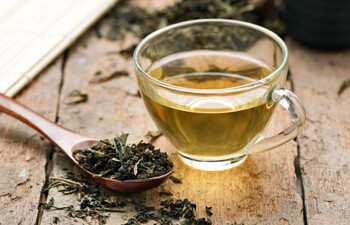Organic Korea Sejak Green Tea

Teas from Korea are just beginning to gain popularity in the United States. Widely unknown, Korean Green Tea is one of the best kept secrets. More akin to a Japanese green tea flavor profile than a Chinese green tea flavor profile; this Organic Sejak Green Tea has a brothy and boldly vegetal cup that pleasantly lingers in the mouth with smooth, mild astringency. The liquor color reminds of an early spring dandelion and the wet leaves smell of dried straw and cooked asparagus with a brighter and thinner cup than our Organic Woojeon Green Tea from Korea. Grown on the volcanic island of Jeju, this loose leaf organic green tea is infused with the salty sea breezes and fertile soil of this pristine area of the world.
Ingredients: organic Korean green tea
Origin: Jeju Island, South Korea

Jeju is the largest island off the coast of the Korean Peninsula, and was formed entirely by volcanic eruptions. The island is still dominated by Hallasan, the largest volcano and mountain in South Korea. The volcanic soil and humid subtropical climate on the island has made it ideal for growing tea, and most of the Korean teas exported to America come from Jeju.
Steeping Instructions

At Arbor Teas, we believe tea should be brewed to suit your personal taste. We’re happy to make recommendations to get you started, but don’t hesitate to experiment! When brewing your tea, your main considerations are tea quantity, water temperature, and steeping time. We recommend green and white teas to be steeped for 2 to 3 minutes in water heated to not-quite-boiling, just as bubbles begin to form on the bottom of the pan (approximately 170 to 180 degrees F). For the best flavor, use fresh water whenever possible. Try not to steep your tea longer than necessary, as you’ll extract undesirable bitterness from the leaves. If you want a stronger brew, don’t steep longer, just use more tea. And don’t forget to re-steep your tea leaves to get the most out of your leaf!
Looking for more info? Check out our How-To Guides and Eco-Brewing Tips!
Staff Perspectives
 Trish
Trish
"A savory treat for sure! For me, this green tea has a delightful buttery cooked vegetable taste that gets me ready for the day. The dry leaves are so silky and green. It makes a beautiful cup of tea!"
 Jeremy
Jeremy
"With leaves slightly larger than the Woojeon leaves, this Sejak is a great example of young Korean teas leaves harvested in late April to May. "
 Aubrey
Aubrey
"If you like Sencha Green, then try this tea! It has a similar flavor profile with a Korean twist and is a great alternative for someone looking to replace their Sencha with a new organic tea or want to mix it up!"
Health Benefits

Like all true tea, green tea offers many potential health benefits. Research has found that tea (Camellia sinensis) can have many positive effects on human health, including improved cardiovascular function, cancer risk reduction, improved immune function, improved oral health, and help with weight management. Tea is also full of polyphenols, which are a class of antioxidant that help your body maintain homeostasis and balance your stress levels.
Green tea specifically is known for its array of health benefits, which have been supported by a growing number of studies. Green tea research has demonstrated that it may be an effective anticancer agent for breast cancer, lung cancer, kidney cancer and prostate cancer, among others. Studies have shown a link between green tea and weight loss, and the ability to modulate energy metabolism, aid in body fat regulation, and possibly promote preferential loss in abdominal fat. Research has also shown that green tea may increase performance for short term memory tasks, as well as being increasing potency of antibiotics. Other peer-reviewed studies link green tea to healthy skin, help with lowering cholesterol, and regulating diabetes. It’s important to keep in mind that many of these studies monitor subjects who drink several cups of green tea per day.
For more information about the health benefits of green tea, and for direct sources of the above information, check out our Tea Health Benefits page!
Please note: the information above is for educational purposes only and has not been evaluated by the Food and Drug Administration. This information is not intended to diagnose, treat, cure, or prevent any disease.








